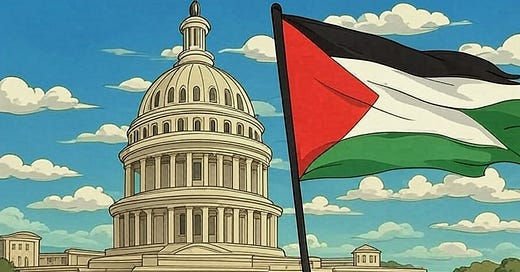Boycott Israel, Face Prison? The Truth Behind Million-Dollar Fines and 20-Year Prison Sentences for Boycotting Israel
From the EAA in the 1970s to H.R. 867 in 2025, the facts behind the anti-boycott legislation
If you've been online recently, you might have come across viral posts warning of new legislation, the so-called “IGO Anti-Boycott Act”, H.R. 867 and how it will impose million-dollar fines or even 20 years in prison for Americans who support boycotts of Israel and how it targets free speech.
So where do these dramatic and misleading claims come from? To understand that, we need to look not only at H.R. 867, but at a broader legal framework that began nearly 50 years ago—and how it applies to U.S. foreign policy, business, and free speech today.
The Origin: Anti-Boycott Law Since the 1970s
U.S. federal anti-boycott policy started in the 1970s, when Congress enacted laws to counter the Arab League boycott of Israel. At the time, U.S. companies and individuals were getting forced by Arab countries to cut ties with Israeli businesses in exchange for access to Middle Eastern markets.
In response, the U.S. made it illegal for Americans to comply with foreign-imposed boycotts that the U.S. government did not support—especially if they were against U.S. allies.
These anti-boycott provisions became part of the Export Administration Act (EAA), originally enacted in 1969 and reauthorized in 1979, later replaced by the Export Control Reform Act of 2018 (ECRA). This legislations are designed to prevent foreign governments from dictating U.S. business behavior and to protect American companies from discriminatory trade practices.
These laws focus not on an individual's personal convictions or right to boycott, but rather on the coerced action of complying with foreign boycotts as a condition for doing business. The key language in the bill specifically targets actions where U.S. companies or individuals are required to cut ties with U.S. allied countries in order to gain access to foreign markets.
If you disagree with such laws, consider this scenario: What if, in order to do import or export to China, you were forced to sing contractual obligations to sever ties or not do businesses in the UK or France? While the current obsession is on Israel, the reality is that this legislation is not specific to one country. Its purpose is to protect American businesses from being coerced by foreign governments into making decisions that could harm our economy and global partnerships.
The law ensures that Americans aren’t put in a position where they have to choose between complying with foreign demands and doing business with trusted allies. It's about safeguarding American economic independence and standing up against unfair foreign influence.
What H.R. 867 Actually Does
H.R. 867 is a short amendment to the Anti-Boycott Act of 2018. It adds international governmental organizations (IGOs)—like the United Nations or European Union—to the list of entities whose boycott requests are prohibited from complying with.
Before this change, the law only covered foreign countries. H.R. 867 expands that list to include international bodies. Importantly, the bill does not introduce new penalties—but that’s also why the viral warnings about fines and prison time are entirely false but they are 100% misleading.
Not About Political Speech—It’s About Compliance with Foreign Demands
H.R. 867—and the laws it modifies—do not ban advocacy, protest, or personal political beliefs. You can support a boycott, speak out, organize a protest, or share your opinion on social media. That is protected by the First Amendment.
What the law prohibits is complying with boycott requests initiated by foreign entities. The core idea is this: if a foreign government or an international body pressures an American company or individual to avoid doing business with a U.S ally.
Why You Haven’t Heard About This Until Now
Federal anti-boycott enforcement typically targets corporations, not individuals. It’s technical, buried in export control regulations, and handled by agencies like the Bureau of Industry and Security—far from the public eye.
This bill doesn’t create new punishments, but it does expand existing its application to organizations like the UN and the EU. It’s part of a legal framework that has existed since the 1970s, originally targeting foreign state-imposed boycotts. What’s new is the inclusion of international organizations.
Understanding this nuance matters. Whether you support or oppose the bill, we can’t have a serious debate about free speech, foreign influence, or U.S. law without knowing exactly what the law does—and what it doesn’t.






That clarifies matters greatly, thank you!